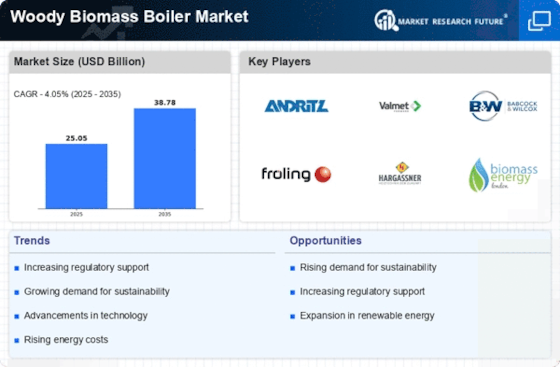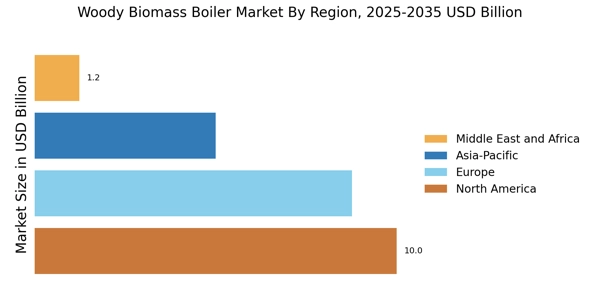Increasing Energy Costs
The rising costs of traditional energy sources are driving interest in the Woody Biomass Boiler Market. As fossil fuel prices fluctuate and often trend upward, consumers and businesses are seeking alternative energy solutions that offer cost stability. Woody biomass, being a locally sourced and renewable resource, presents a viable option for mitigating energy expenses. The potential for long-term savings through the use of biomass boilers is becoming increasingly attractive, especially for industries with high energy demands. Furthermore, as energy prices continue to rise, the economic feasibility of investing in woody biomass boilers is likely to improve, leading to greater market penetration. This trend suggests a shift in energy consumption patterns, with biomass solutions gaining traction as a reliable and cost-effective energy source.
Government Incentives and Policies
Government incentives and supportive policies play a crucial role in propelling the Woody Biomass Boiler Market. Many governments are implementing financial incentives, such as tax credits and grants, to encourage the adoption of renewable energy technologies. For instance, various countries have established feed-in tariffs and renewable portfolio standards that favor biomass energy production. These initiatives are designed to reduce greenhouse gas emissions and promote sustainable energy practices. As a result, the woody biomass boiler market is likely to experience accelerated growth, as businesses and homeowners are motivated to invest in these systems. The alignment of government policies with environmental objectives further enhances the attractiveness of woody biomass boilers, potentially leading to a more robust market landscape.
Rising Demand for Renewable Energy
The increasing The Woody Biomass Boiler Industry. As nations strive to meet their energy needs sustainably, the demand for biomass energy solutions has surged. According to recent data, the biomass energy sector is projected to grow at a compound annual growth rate of approximately 6% over the next few years. This growth is largely attributed to the need for cleaner energy alternatives to fossil fuels, which are being phased out in many regions. Consequently, woody biomass boilers, which utilize organic materials for energy production, are becoming increasingly popular. This trend not only supports energy independence but also aligns with environmental goals, making the woody biomass boiler an attractive option for both commercial and residential applications.
Environmental Sustainability Initiatives
The growing focus on environmental sustainability is a significant driver for the Woody Biomass Boiler Market. As climate change concerns escalate, both consumers and businesses are prioritizing eco-friendly energy solutions. Woody biomass boilers, which utilize renewable organic materials, align well with these sustainability goals. The ability of biomass systems to reduce carbon emissions and promote circular economy practices is particularly appealing. Recent studies indicate that biomass energy can result in up to 80% lower greenhouse gas emissions compared to fossil fuels. This environmental advantage is likely to encourage more stakeholders to consider woody biomass boilers as a viable alternative. As sustainability initiatives gain momentum, the market for woody biomass boilers is expected to expand, driven by a collective commitment to reducing environmental impact.
Technological Innovations in Biomass Boilers
Technological advancements in biomass boiler systems are significantly influencing the Woody Biomass Boiler Market. Innovations such as improved combustion efficiency, automated feeding systems, and enhanced emissions control technologies are making woody biomass boilers more appealing to consumers. These advancements not only increase the operational efficiency of the boilers but also reduce their environmental impact. For example, modern systems can achieve efficiencies exceeding 90%, which is a substantial improvement over older models. This technological evolution is likely to attract a broader customer base, including industries seeking to lower their carbon footprint. As the market continues to evolve, the integration of smart technologies and IoT capabilities may further enhance the functionality and appeal of woody biomass boilers.

















